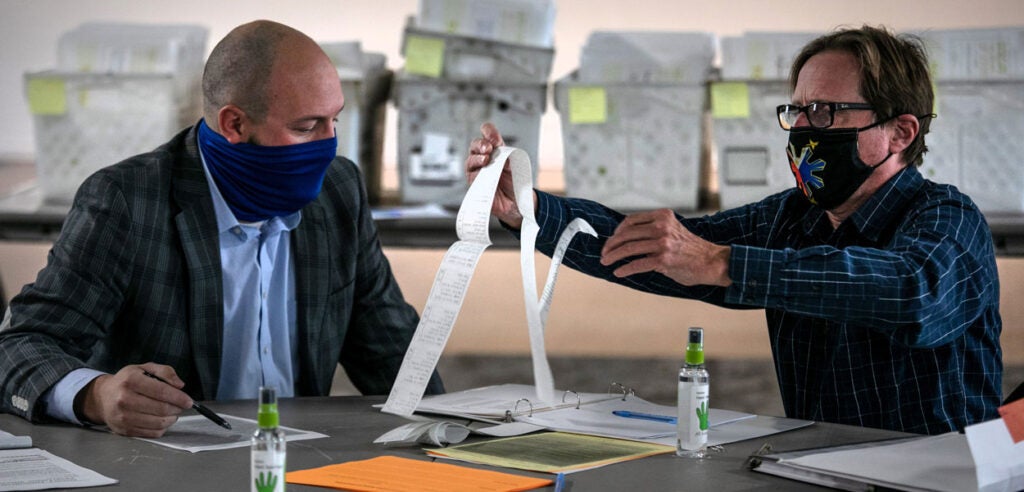State legislatures, take note: Americans have legitimate concerns over election integrity, as amply demonstrated by the many proven instances of voter fraud that we continue to add to The Heritage Foundation’s Election Fraud Database.
These vulnerabilities within the electoral process need to be addressed as soon as possible.
The right to self-government depends on free and fair elections. We should have zero toleration for actions that interfere with the choices of voters at the ballot box.
Heritage’s database catalogs 1,311 cases of voter fraud, one of the most recent occurring during the 2020 election.
In that case, Michigan resident Paul Parana pleaded guilty to one count of impersonating someone else to vote in an election. Authorities said Parana filled out and signed an absentee ballot on behalf of his daughter. He was sentenced to 90 days of probation and ordered to pay $1,100 in fines and court costs.
Another case arose out of the May special election in Paterson, New Jersey, for the Ward 3 seat on the City Council. A superior court judge overturned the election results due to serious questions about the validity of “mail-in votes.”
The special election had been conducted completely by mail, and allegations of an absentee ballot trafficking scheme and fraud began to surface shortly after the results were tabulated.
Judge Ernest Caposela concluded that the election was “not the fair, free, and full expression of the intent of the voters.”
Shockingly, officials rejected 24.3% of all ballots, compared with the county’s average rejection rate of around 9% in past elections.
The New Jersey Attorney General’s Office has been investigating the origins of the voter fraud in Paterson. Police have made four arrests in connection with the alleged scheme. The four, all presumed innocent at this stage, include council member Michael Jackson, council member-elect Alex Mendez, Shelim Kahlique, and Abu Razyen.
Another case from New Jersey involves a noncitizen voting in the 2004 general election. Cristobal Calix, a Honduran citizen who is a legal U.S. resident, registered and voted at least 14 times between 1984 and 1996, authorities say.
Calix eventually was held to be removable when he applied for citizenship and admitted that he had voted illegally in past elections without being caught.
In Wisconsin, authorities say Chad Armstrong, a convicted felon, voted in the 2018 election despite being ineligible under state law. As part of a plea bargain, Armstrong pleaded guilty to a misdemeanor and spent five days in jail.
In West Virginia, authorities said Morgantown City Council candidate Timothy Metz forged signatures on his petition to get on the ballot for the 2019 election. In investigating, the West Virginia Secretary of State’s Office found that Metz forged 21 signatures, including that of a deceased voter.
Metz dropped out of the council race after admitting he “cut corners” to collect his signatures, authorities said. In exchange for pleading guilty to a felony charge, he was permitted to enter a pretrial diversion program with 24 months of supervised probation.
Pennsylvania’s special election in 1993 for state Senate, recently added to the database, highlights what can happen when political operatives and campaigns subvert the will of the people to steal an election.
A state senator’s unexpected death created an even split between Republican and Democratic legislators in Pennsylvania, raising the stakes for the ensuing special election since it would decide which party would control the state Senate.
Authorities said campaign workers, including Barbara Landers and Ramon Pratt, engaged in a massive absentee ballot scheme in an effort to elect their preferred candidate, William Stinson, the Democratic nominee for the Senate seat.
Campaign workers, primarily targeting black and Hispanic districts, coerced voters to request and vote using absentee ballots. To do so, they falsely claimed to residents—many of whom could not understand the English instructions on the ballots—that a new law allowed them to vote absentee for any reason.
Prosecutors said election officials colluded with the Stinson campaign by giving campaign workers absentee ballots and applications to take to voters.
Stinson campaign workers would tell voters to vote the straight Democratic ticket or tell them who to select, and, in some cases, fill out ballots and forge voters’ signatures. Campaign workers were paid one dollar for every completed application and absentee ballot submitted.
District Judge Clarence C. Newcomer invalidated over 600 absentee ballots from the districts in question. Newcomer concluded widespread fraud was facilitated by the involvement and complicity of two Democratic city commissioners in Philadelphia and an elections supervisor in Philadelphia County.
Supreme Court Justice Clarence Thomas recently referred to the case in his dissent in Republican Party of Pennsylvania v. Degraffenreid.
Or take this example from Texas: Adrian Heath and an organized group of nine others falsely registered a Residence Inn hotel as their home address, in a district in which they did not live.
Authorities said Heath and the others wanted to falsely establish residency so that they could vote in an attempt to gain control of a local utility board. Heath served just under six months for the crime of voting illegally.
Voters deserve integrity in every step of the process, and states should prioritize fixing vulnerabilities in their laws to ensure fair and free elections.
Have an opinion about this article? To sound off, please email letters@DailySignal.com and we will consider publishing your remarks in our regular “We Hear You” feature.
